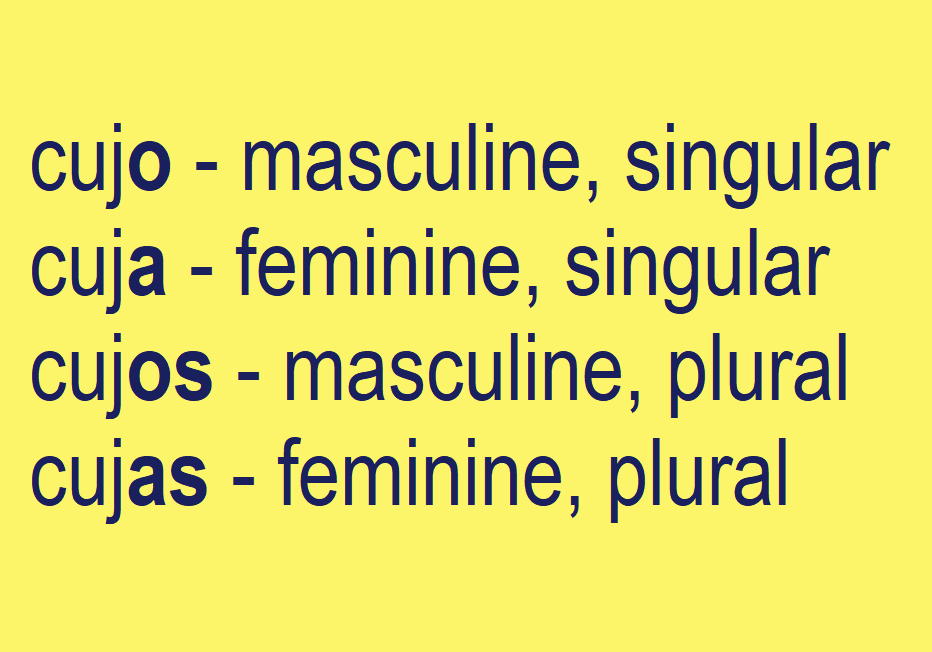How to use “whose” in Portuguese Posted by carol on Oct 22, 2017 in Grammar, Learning
Ei, gente! Como está o outubro de vocês? Hey, people! How is your October going?
The word whose is very common in English and it indicates posse (possession). Whose can be used in two ways: as an pronome interrogativo (interrogative pronoun) and as a pronome relativo (relative pronoun). But how can we say that in Portuguese? As it turns out, we don’t have an exact word that can be translated into whose, but there are ways to express it depending on the context. Veja (take a look):
Pronome interrogativo – Interrogative pronoun
Interrogative pronouns are phrases used to fazer perguntas (ask questions) such as o que (what), quem (who), qual (which), onde (where), por que (why) and quando (when). In the case of whose, we say de quem in Portuguese to ask about something’s owner, to know to whom it belongs. Compare how to aks a question with whose and with de quem:
De quem é esse livro? – Whose book is this?
De quem são aquelas crianças? – Whose children are those?
Can you tell the difference between the construction of the sentence in both languages? In English, whose is followed by a substantivo (noun) so we can add the verb, while in Portuguese the order generally is ‘de quem’ + verbo.
Read some examples:
- De quem é aquele carro? – Whose car is that?
- De quem é essa chave? Encontrei no chão – Whose keys are these? I found them on the floor
- De quem é esse vestido que ela está usando? – Whose dress is she wearing?
- Ele é marido de quem? Da Jane ou da Anna? – Whose husband is he? Jane’s or Anna’s?
- Você vai dormir na casa de quem? – In whose house are you going to spend the night?
- A pintura de quem você mais gostou no Louvre? – Whose painting did you like best at the Louvre?
- Elas estão visitando o apartamento de quem? – Whose apartament are they visiting?
Pronome relativo – Relative pronoun
Whose as a relative pronoun in English is used to provide more informarion about a subject, still expressing a relation of possession. In this case, we say the word cujo(a/os/as) in Portuguese. In this situation, the word is followed by a noun too. What is important to remember is that cujo must agree in gender and number, therefore we use:

- Essa jornalista é uma mulher cuja opinião eu respeito muito – This journalist is a woman whose opinion I respect a lot (opinião is feminine, singular)
- Eu não respeito pessoas cujas atitudes são hipócritas – I don’t respect people whose attitudes are hypocritical (atitudes is feminine, plural)
- Minha prima vai se casar com um homem cuja família é muito rica – Our cousin is marrying a man whose family is rich (família is feminine, singular)
- Meu chefe, cujo trabalho envolve viajar muito, é fluente em francês e espanhol – My boss, whose work involves traveling a lot, is fluent in French and Spanish (trabalho is masculine, singular)
- O urso é um animal cujo pelo o protege do frio – The bear is an animal whose fur protects it from the cold (pelo is masculine, singular)
- Aquele é o escritor cujos livros eu te falei que são ótimos – That is the writer whose books I told you are great (livros is masculine, plural)
- Ele saiu com o John e com aquele outro amigo cujo nome eu esqueci – He went out with John and that other friend whose name I forgot (amigo is masculine, singular)
- O Brasil é um país cujos problemas remontam o período colonial – Brazil is a country whose economical problems date back to its colonial times (problemas is masculine, plural)
- Steven Spielberg, cujas obras são respeitadas pela crítica, é diretor e também roteirista – Steven Spielberg, whose work is acclaimed by the critics, is a director and also a scriptwriter (obras is feminine, plural)
Boa semana! Good week!

Build vocabulary, practice pronunciation, and more with Transparent Language Online. Available anytime, anywhere, on any device.





Comments:
Thaís:
Olá!
A introdução dá a entender que o português não tem “an exact word that can be translated into whose” at ali, o que não é verdade.
Isso só acontece no caso do pronome interrogativo, mas não no caso de pronome relativo.
Obrigada pelo belo trabalho!